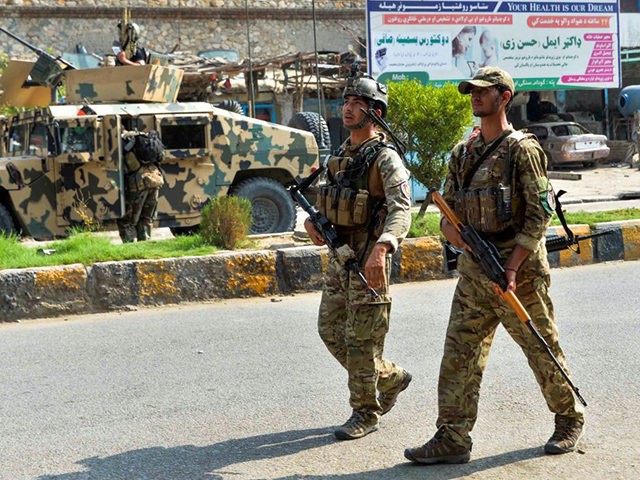Afghanistan’s National Directorate of Security (NDS) arrested ten Chinese nationals who were allegedly operating a “terror cell in the capital city of Kabul,” according to a Christmas Day report from the Hindustan Times.
According to the Hindustan Times’ sources, “the crackdown has come as a huge embarrassment for Beijing, which has been trying to persuade the Ashraf Ghani government to hush up the case.”
Afghan President Ashraf Ghani reportedly selected First Vice President Amrullah Saleh to meet with Chinese officials and oversee the case, possibly with an eye toward pardoning the ten accused spies if Beijing “submits a formal apology that admits to the violation of international norms and a betrayal of Kabul’s trust.”
The report said the ten Chinese nationals were working with the Haqqani Network, the infamous terrorist organization and crime ring that works closely with the Taliban. Among other nefarious exploits, the Haqqani Network was involved with the capture and ransom of American deserter Bowe Bergdahl in 2009.
If the Hindustan Times account is accurate, the Chinese agents were doing a lot more than just communicating with the Haqqani organization. The group was purportedly led by a man named Li Yangyang, who was arrested at his home in Kabul:
The NDS team seized arms, ammunition and Ketamine powder, a recreational drug , from his residence when the first round of raids were carried out on 10 December. NDS officials who have questioned Li have reported that he had been gathering information about al Qaeda, Taliban and Uyghurs in Kunar and Badakhshan provinces, according to this counter-terror official. A Chinese woman was the second person to be arrested. Sha Hung, who runs a restaurant in Kabul’s Shirpur was also arrested the same day.
“From her place, NDS recovered explosive material and other incriminating items,” the counter-terror official said.
[…]
Investigators, a diplomat in New Delhi said, were still trying to ascertain the precise activities of the espionage ring and any possible linkage to Pakistan’s deep state. One view within the Afghan security establishment is that the detainees were creating a fake East Turkestan Islamic Movement (ETIM) module in Afghanistan to entrap ETIM operatives in Afghanistan.
ETIM has been in the news recently because the United States formally removed the organization from its list of foreign terrorist organizations last month. The U.S. State Department noted the group appears to have dissolved over a decade ago, despite China’s efforts to portray it as a perpetual security threat that justifies harsh repression of the Uyghur Muslims of Xinjiang province — the area that would become “East Turkestan” if the ETIM separatists accomplished their purported objectives.
Uyghur activists around the world welcomed the U.S. delisting of ETIM, while Beijing angrily denounced it, accusing the U.S. of indulging terrorism. The Hindustan Times report implies the Chinese spy ring in Kabul was trying to arrange some false-flag terrorist attacks, enabling the Chinese government to claim ETIM is still an active threat and the U.S. was wrong to remove it from the list of terrorist organizations.
Afghanistan’s Khaama Press confirmed several details of the report with other sources Saturday, including the seizure of arms, drugs, explosives, and “incriminating items” from Li Yangyang’s residence and Sha Hung’s restaurant.
Yahoo News quoted Indian media sources who claimed, “Pakistan’s notorious spy agency, the Inter-Services Intelligence (ISI), apparently worked as a mediator between the Chinese spies and the terror outfit.” According to these sources, Pakistan helped with the espionage project because it wants to strengthen its ties with China and shares Beijing’s view of the Uyghurs as a danger to regional security.
Afghanistan’s First Vice President Amrullah Saleh, named by the Hindustan Times as point man for the Ghani administration on the Chinese spying case, said Sunday that the reports of Chinese agents arrested by Afghan security are false.
As quoted by Turkey’s Anadolu Agency, Saleh said last week’s terrorism arrests involved Taliban militants, not Chinese operatives. He said the Taliban arrested in Kabul were working on a detailed “11-point plan” to “weaken the will of the people in defense of democratic values.”

COMMENTS
Please let us know if you're having issues with commenting.